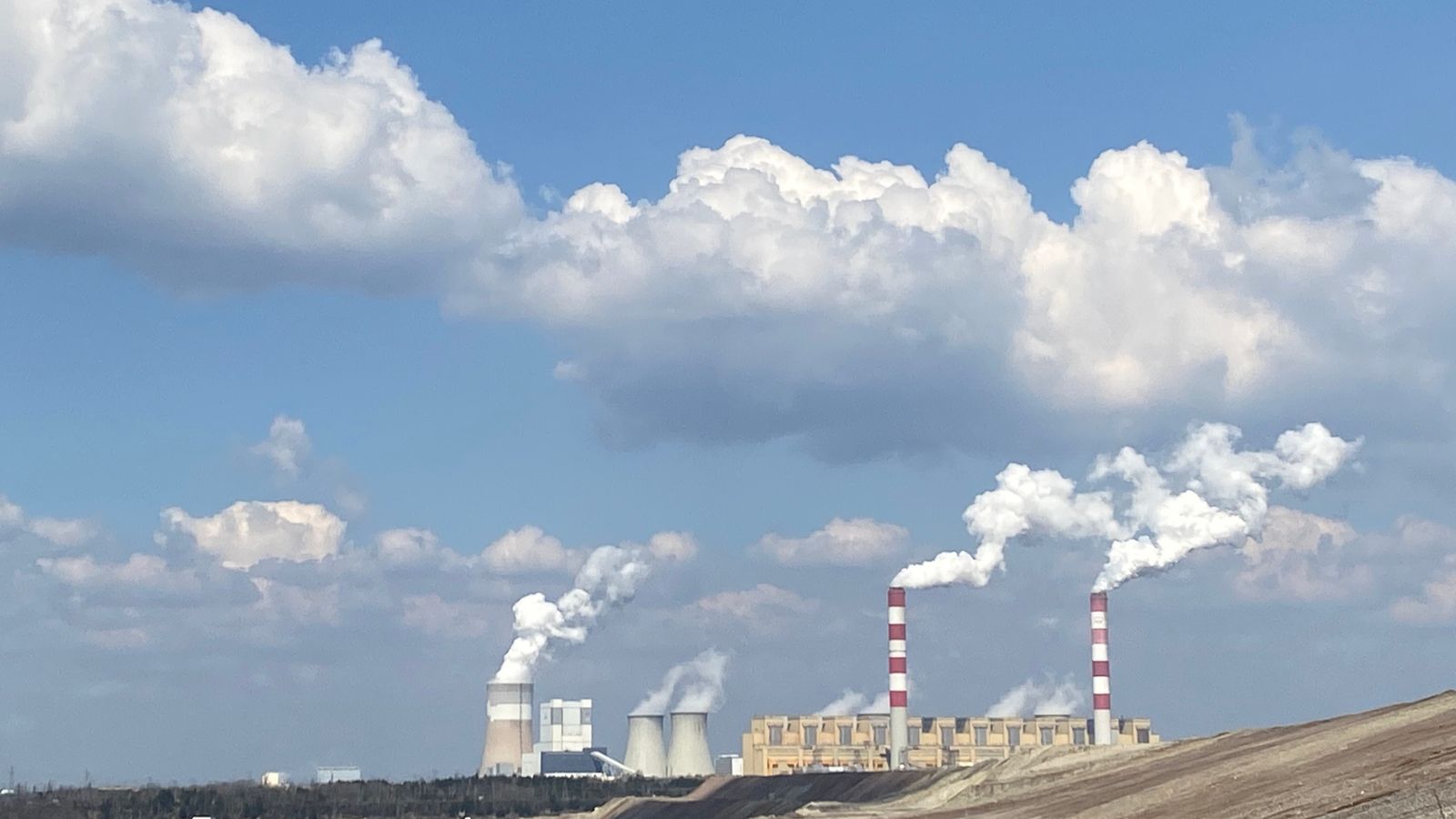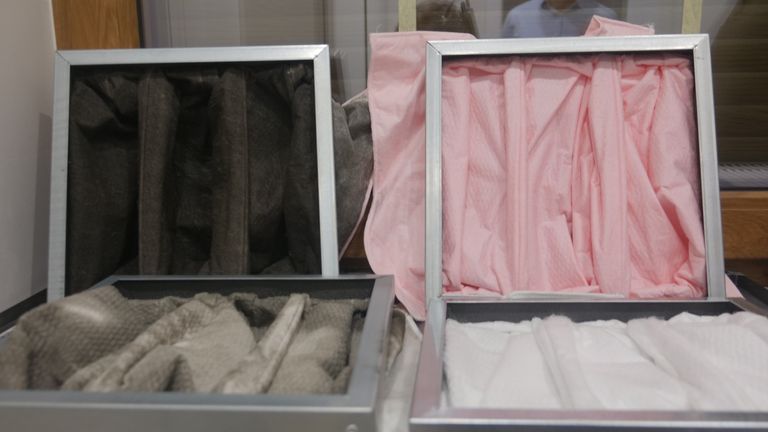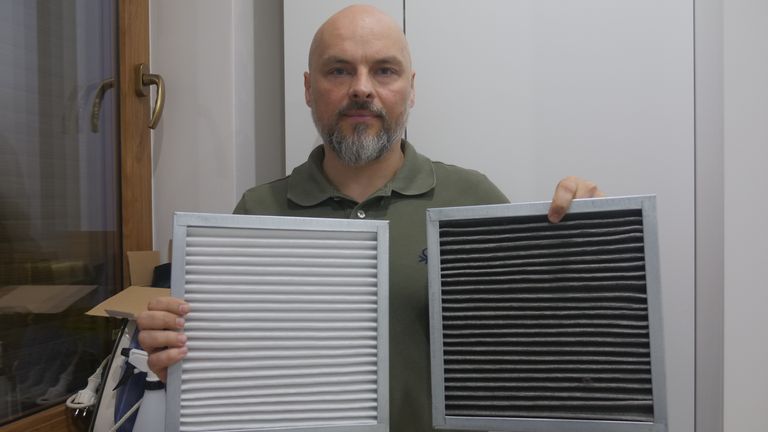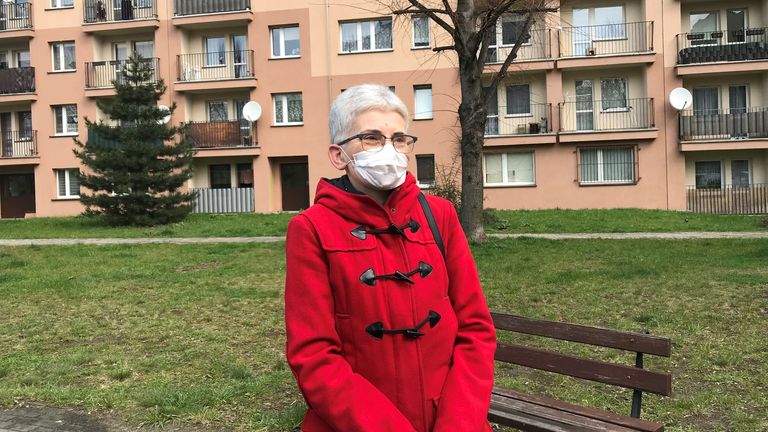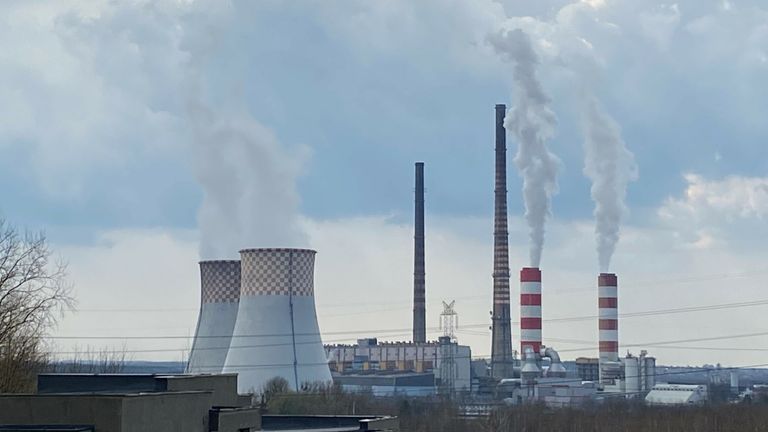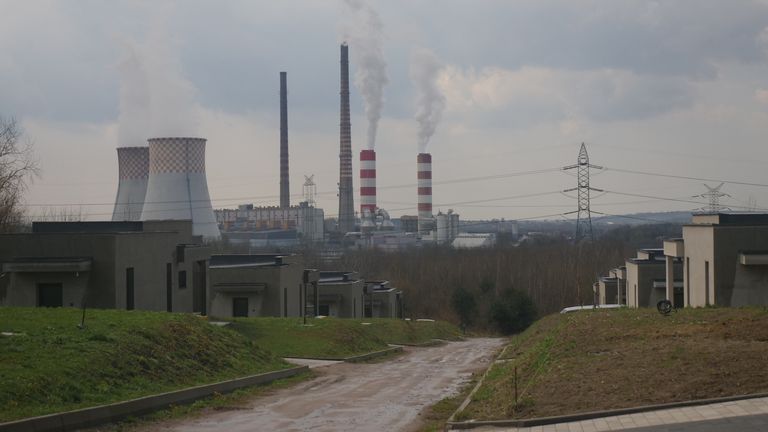In his neat flat in the Polish town of Rybnik, Emil Nagalewski sips a coffee, strokes his cat and then asks if we want to see how he stops his family being poisoned by the air around us.
We are taken to a small anteroom, where Emil shows us the silver pipes leading into the side of a cupboard.
Inside it is the machinery for removing the toxic particles that spew around in this corner of Poland – the residue from coal being mined and then burnt in homes and power stations.
Follow all the latest from Earth Day on the Sky News live blog
Today is the day for changing the filters. There are three of them, and they have only been in place for 10 or 12 weeks.
The first is the main one, but it’s corrugated and hard to see.
The second comes out so dark that I assume the fabric is supposed to be a shade of brown that is nearly black.
Except, of course, it isn’t. A new filter is brilliant white but after three months as the back-up line of defence, it’s absorbed so many particulates – so much microscopic airborne rubbish – that it’s completely changed colour.
Even the third filter, there to catch stuff missed by the first two, is a depressing mass of dark grey.
And if you don’t have a filtration system in your home, and most people don’t, then this is what you breathe in as you sit and chat, and eat dinner and check your emails.
“It is frightening and shocking when I look at it,” says Emil.
“I’m sure I’m terrified of it. Certainly when you know what you are breathing, what your family, and your child, are breathing then that is not a good feeling.”
Emil’s son Antony took part in a recent scientific research study, which compared the impact of pollution among young children in Rybnik with kids in the French city of Strasbourg, a place with a similar industrial heritage.
The results were wholly depressing.
The Polish youngsters had five times as many particles of black coal in their body as the French.
Subscribe to ClimateCast on Spotify, Apple Podcasts, or Spreaker
Professor Tim Nawrot, the Belgian academic who conducted the tests, told us that he had never seen such high levels of black carbon in children, and that there would be long-term health consequences.
Because of their active metabolisms and growing bodies, children are often affected more by air pollution than adults.
“It increases asthma, it increases the risk of cardiovascular diseases and it has cognitive health consequences,” said Professor Nawrot.
“So many parts of the body are affected. Some of the health effects are seen immediately and others are more on a long-term basis.
“The Polish government should be more ambitious about lowering levels of pollution for public health and also for climate change issues.”
For the people of Rybnik, air pollution is an unwelcome, but obvious, part of daily life.
A huge power plant sits near the edge of the town, burning millions of tonnes of coal every year.
Coal is also commonly used for domestic fuel; rubbish often gets burnt too.
The result of all this is that the air in Rybnik smells, perhaps even tastes, of burning coal.
At first, it is reminiscent of a roaring winter fire, but then, as it lingers, the romance dissipates.
Because the taste is pollution, and it’s killing people.
The European Environment Agency’s latest report into air quality shows pollution in almost every part of Poland exceeding European air quality standards.
Concentrations of harmful airborne particles, known as PM10 and PM2.5, were higher in Poland than any other European country.
Air pollution causes a grim litany of health problems, including cancer, heart disease and respiratory problems.
It’s reckoned that nearly 50,000 people die each year in Poland because of the effects.
Staggeringly, of the 50 most polluted cities in Europe, 36 are in Poland.
Joanna Bulandra has been living in Rybnik for 40 years. Now, in her 60s, she is stricken with illness, but cannot afford to move out.
“All the time my body has been exposed to these quite strong air pollutants and I developed bronchial asthma, undefined because it is not known what causes it,” she says.
“Doctors in Poland are not yet prepared to diagnose that smog as the cause, so they say that it is undefined and that it is not known where it comes from.”
She smiles, sure that both she, and the doctors, know exactly what caused her illness.
“It’s been for over a dozen years, 15, maybe even 17 that I have been taking inhalation medications that simply protect my body against acute shortness of breath, problems with breathing and such irritation of the lungs that prevents me from breathing,” she adds.
“I just feel the need to get out into the fresh air but there is no fresh air. It depresses me. I’m 66 years old and I don’t have that many years ahead of me.
“Whilst climate change probably won’t affect me, I have children and grandchildren and I would like them to live in a good world. But I don’t have much hope.”
The European Union wants to be carbon neutral by 2050, meaning that there is a balance between greenhouse gases that are put into the atmosphere, and those that are taken out.
But achieving that target in Poland, where coal-fired power stations supply more than 70% of the electricity, will not be easy.
For one thing, the cost of building a new, clean energy infrastructure will be enormous.
For another, there are around 150,000 people directly employed by the coal industry in Poland, often in places where the local economy is dependent on a power station or a mine.
“Of course, it is all about money,” says Dominik Tarczynski, an MEP with the ruling Law and Order party.
“Yes, we know that saving lives is more important than jobs. But how do you live without a job?
“How do these 150,000 people feed their families and children? How will they cope without a job? So we have to go through this transition with this plan.
“It’s all about money. It’s true. It’s all about money because money will provide stable jobs.”
Poland knows that it will have to change.
A poll shows that half the population would welcome the end of coal, although that clearly suggests that the other half wouldn’t.
The political desire is – broadly – there.
Poland doesn’t want to end up as an environmental outcast, and the pressure from the EU is significant.
It’s just that cutting ties with coal will require real political action, and vast amounts of money, technology and a plan for huge social change.
And right now, that package simply isn’t there.
As we left Rybnik, we drove past a small house in an untidy street with a small garden.
And there, arranged in the corner, was a big pile of glistening, treasured coal.
Sky News broadcasts the first daily prime time news show dedicated to climate change.
Hosted by Anna Jones, The Daily Climate Show is following Sky News correspondents as they investigate how global warming is changing our landscape and how we all live our lives.
The show will also highlight solutions to the crisis and show how small changes can make a big difference.
